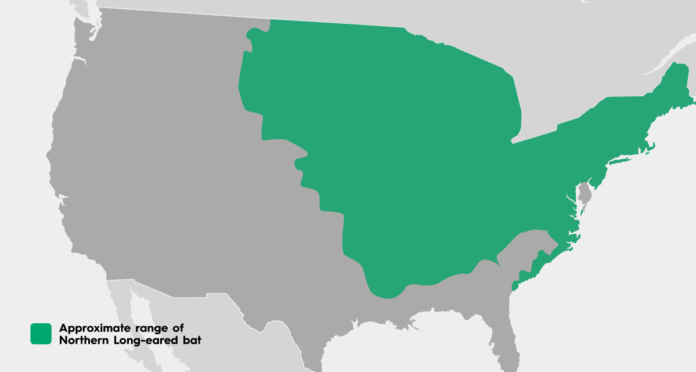Natural Power, a renewable energy consultancy and service provider, is accelerating the implementation of its EchoSense smart bat curtailment technology in a move to ensure the protection of endangered bat species at wind projects in North America.
On January 30, the U.S. Fish and Wildlife Service will officially up-list the northern long-eared bat to endangered. For wind energy professionals, this means that the exemption for wind energy projects under the 4(d) rule no longer applies. This will have a major impact on wind turbine operations – effectively doubling the installed U.S. capacity that is located within the range of an endangered species of bat and may now be subject to minimization strategies such as curtailment.
“Project owners and operators may need to consider smart curtailment measures to ensure energy production is not significantly compromised by the change to the listed status of this species,” says Kevin Denman, head of environmental technology at Natural Power. “The current standard practice of blanket curtailment at specific times of year to protect bats when they are most likely to be active means that operators may be losing out on significant energy production due to projects being curtailed when bats are not present. We need a better solution – environmentally and commercially.
“Our EchoSense system is tried, tested, installed and operating across numerous sites in North America to protect bats when they are active on a site, while allowing operation and energy production in times when they are not present,” continues Denman.
If the tricolored bat is also listed as endangered as proposed in late 2022, over 70% of operational U.S. wind projects would then fall within the range of an endangered species of bat.
Following a proof-of-concept deployment in 2019 and supported by the U.S. Department of Energy (DOE) as well as the National Renewable Energy Laboratory (NREL), Natural Power worked with Alliant Energy to install and operate a full system from August to October 2020 at the English Farms wind farm in Iowa.
The efficacy study of EchoSense at English Farms is currently in the final stages of peer review by the DOE and the report submitted demonstrates that the technology can maintain a reduction in bat fatalities comparable to a blanket curtailment strategy while giving back approximately 40-50% of energy production that would otherwise be lost under blanket curtailment methods. The environmental and commercial benefits offer an ideal solution to this industry-wide challenge.
While the exact production numbers for the 69 wind turbines at English Farms are not public, for a wind farm of similar size with average wind conditions, EchoSense can increase the energy production by more than 5,000 MWh per year.
The EchoSense system can be grouped into two subsystems: a detection subsystem that collects bat acoustic and environmental data, and a decision subsystem that processes data against a predetermined rule set and issues commands to curtail or release turbines.
Meteorological data is collected on every turbine and processed against highly configurable bat protection rules for each turbine. Curtailment commands are issued to individual turbines. Presence of bats can be aggregated site-wide or by predefined zones (based on data driven approach) allowing optimization for geography and habitat of individual sites. Nacelles that are instrumented for acoustic data collection are fitted with microphones mounted on brackets on the top of the nacelle, and a bat detector within the nacelle.
The bat detector sends data through the project network to the EchoSense server located onsite which processes the data and executes farm-level control. The system is engineered to ensure durability of components, NERC CIP compliant network security, and minimal, simple and safe periodic maintenance. Bat detection that occurs within the predefined rules set (season, temperature, wind speed, etc.) will result in curtailment.




